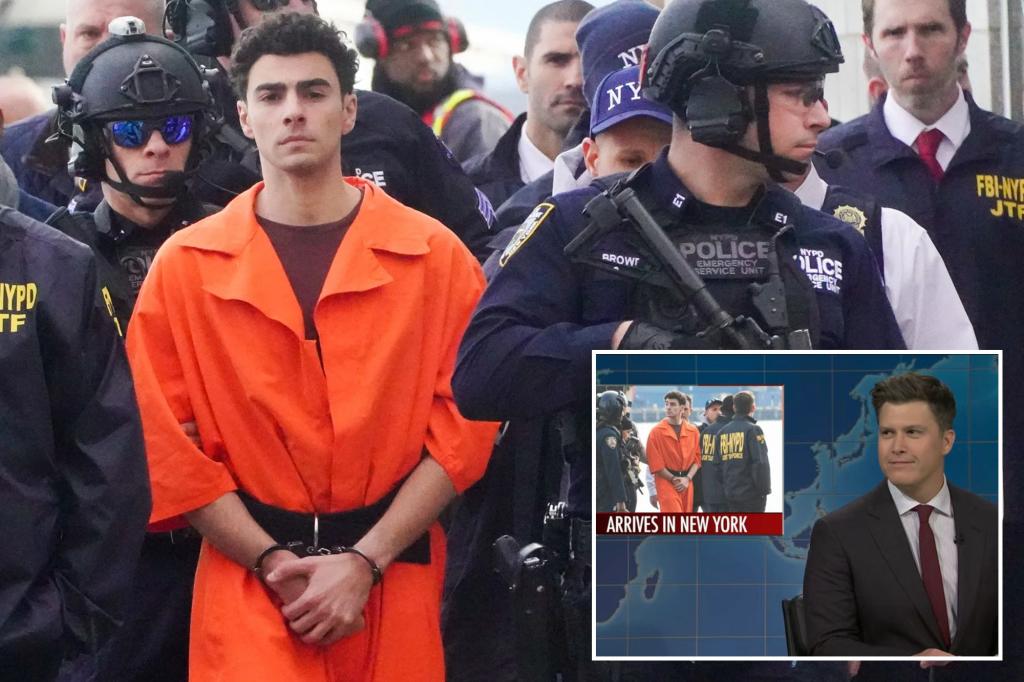The unexpected eruption of applause from the Saturday Night Live (SNL) studio audience at the mere mention of Luigi Mangione, accused of assassinating UnitedHealthcare CEO Brian Thompson, has ignited a firestorm of controversy and highlighted the disturbing trend of romanticizing violent acts against corporate figures. The incident, occurring during the “Weekend Update” segment hosted by Colin Jost, revealed a stark disconnect between the gravity of the crime and the audience’s reaction, raising questions about the influence of political ideologies and the potential for media platforms to inadvertently normalize or even encourage violence.
Mangione, a 26-year-old Ivy League graduate, has become an unlikely figure of admiration among a segment of the anti-capitalist left, who view his alleged crime as a form of rebellion against corporate greed. This sentiment, however misplaced and dangerous, has manifested in an outpouring of support for Mangione, including letters and monetary contributions to his commissary account. The SNL audience’s reaction further amplified this disturbing trend, transforming a man accused of murder into a symbol of resistance, cheered on by a crowd seemingly oblivious to the devastating consequences of his actions.
Colin Jost’s response to the audience’s applause, described as a mixture of surprise and awkward amusement, further fueled the controversy. His sarcastic remark, “You’re ‘wooing’ for justice, right?”, while seemingly intended to address the absurdity of the situation, failed to adequately condemn the audience’s behavior. Critics argue that Jost’s tepid reaction normalized the applause, sending a message that such displays of support for accused murderers are acceptable, or at least not worthy of serious rebuke. This perceived lack of condemnation has drawn sharp criticism from journalists and commentators, who have accused Jost and SNL of promoting a culture of violence and disrespect for the rule of law.
The incident has sparked a broader debate about the role of media, particularly comedy shows like SNL, in shaping public opinion and influencing political discourse. While SNL has a long history of satire and social commentary, often pushing boundaries and challenging conventional wisdom, the audience’s reaction to the mention of Mangione raises concerns about the potential for such humor to be misinterpreted or co-opted by extremist groups. The line between satire and endorsement can be blurry, and in this case, the audience’s applause seemed to indicate a disturbing level of support for violence against corporate leaders.
The romanticization of Mangione’s alleged crime reflects a growing anti-CEO sentiment within certain left-wing circles. This sentiment, fueled by economic inequality and a perception of corporate greed, has led to the demonization of CEOs and other high-ranking executives, often portraying them as symbols of oppression and exploitation. While legitimate criticisms of corporate practices and the unequal distribution of wealth are valid, the celebration of violence as a solution is both dangerous and counterproductive. It undermines the principles of justice and due process, and it creates a climate of fear and intimidation that can stifle constructive dialogue and meaningful social change.
The incident at SNL serves as a stark reminder of the potential for extremist ideologies to infiltrate mainstream media and influence public perception. The audience’s applause for an accused murderer highlights the dangers of romanticizing violence and the importance of responsible media coverage. It also underscores the need for critical thinking and a nuanced understanding of complex social and economic issues. The celebration of violence, regardless of the perceived justification, is never the answer. It is essential to condemn such actions and to promote peaceful and constructive means of addressing societal problems. The incident should serve as a wake-up call for media outlets to be more mindful of the potential consequences of their content and to actively combat the normalization of violence.

